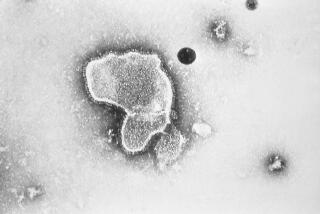Vaccine Blocks Cervical Cancer
- Share via
An experimental vaccine against one strain of the human papilloma virus blocked most infections and, more important, prevented development of a precursor to cervical cancer, researchers said Monday.
The results are an important step toward the eradication of cervical cancer, which strikes about 15,000 women in the U.S. annually, killing a third of them. Globally, the disease strikes half a million women every year and kills 60% of them.
Researchers from the University of Washington in Seattle presented data two years ago showing that the vaccine blocked new infections with the virus. The new data from the same group, presented at an infectious diseases conference in Washington, D.C., shows that the protection persists for at least four years and demonstrates for the first time that it prevents cancer development.
Cervical cancer is mainly spread through sexually transmitted strains of the human papilloma virus. HPV also can cause a variety of cervical problems that appear as abnormalities on a Pap smear, which necessitate further tests to rule out the presence of cancer.
The vaccine is directed against just one of the 20 common papilloma viruses -- HPV-16 -- but that one strain currently infects 20% of the U.S. population and causes half of all cases of cervical cancer.
Merck & Co., the manufacturer of the vaccine, is also testing a second-generation version that would protect against four HPV strains that collectively cause 80% of cervical cancers and 90% of genital warts. The company will seek approval from the U.S. Food and Drug Administration next year, said Dr. Eliav Barr of Merck, who is in charge of its development.
“We’re going to take a big chunk out of HPV-related disease,” he said.
Epidemiologist Laura A. Koutsky and her colleagues at the University of Washington gave the current single-virus vaccine in three doses to 755 women ages 16 to 23. An additional 750 received a placebo.
After an average of about four years, seven of the women who received the vaccine developed HPV-16 infections, compared with 111 infections among those who received the placebo.
More important, she said, none of those who received the vaccine showed signs of cervical intraepithelial neoplasias -- localized lesions that, if not detected and removed, can lead to cervical cancer.
“All of them were prevented, which is very exciting to see,” Koutsky said.
Of those who received the placebo, 24 developed lesions.
The vaccine is made of virus-like particles, grown in yeast, that have all of the surface proteins of the virus, but none of its genetic information. It was created by Dr. Douglas Lowy of the National Cancer Institute.
The government gave the rights to the vaccine to Merck and to GlaxoSmithKline Biologicals, but Merck is slightly ahead in the race to bring it to market.






